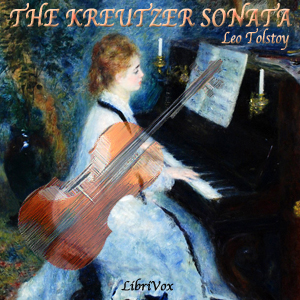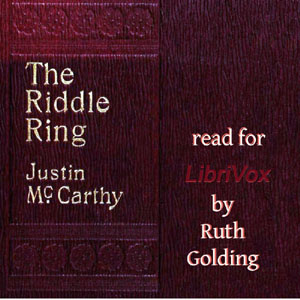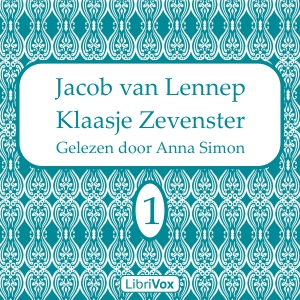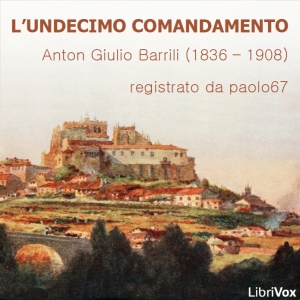Publication of The Kreutzer Sonata in 1889 was a significant intellectual event worldwide. Censored in Russia, it set off an explosive debate in Europe, America, and Asia on matters relating to sexual abstinence and the hypocrisy of marriage. The novella emphasizes Tolstoy's controversial view on sexuality, which asserts that physical desire is an obstacle to relations between men and women and may result in tragedy. The Kreutzer Sonata has been recognized as among the best examples of Tolstoy's art of storytelling.(Introduction by Dorlene Kaplan)
28 episodes
De kerstverhalen van Charles Dickens uit het jaar 1864. Hoofdstuk 1 en 7 vormen een doorlopend verhaal dat het vervolg is van hoofdstuk 1 en 7 van het boek Juffrouw Lirriper en haar commensalen. De andere hoofdstukken zijn aparte korte verhalen. (Inleiding door Marcel Coenders)
14 episodes
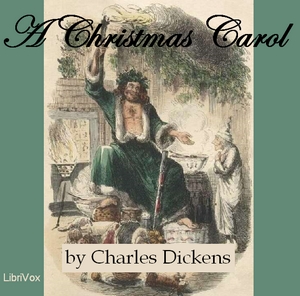
A Christmas Carol is a novella by English author Charles Dickens first published by Chapman & Hall on 17 December 1843. The story tells of sour and stingy Ebenezer Scrooge's ideological, ethical, and emotional transformation after the supernatural visitations of Jacob Marley and the Ghosts of Christmases Past, Present, and Yet to Come. (Summary by Wikipedia)CastEbenezer Scrooge: Andy MinterFred: mbBob Cratchit: David RichardsonGentleman: Martin LangerJacob Marley: Algy PugGhost of Christmas Past: Tricia GFan/Tiny Tim: rashadaYoung Scrooge/Peter Cratchit: Paul AndrewsSchoolmaster/Man 2: Peter BishopFezziwig: John SteigerwaldBelle: AvailleBelle's Husband/Man 3: Levi ThrockmortonGhost of Christmas Present: Barry EadsMrs. Cratchit: Arielle LipshawMartha Cratchit/Girl: Christin ChapelleBelinda Cratchit/Caroline: Amy GramourScrooge's Niece: Veronica JenkinsNiece's Sister: Liberty StumpMan 1: David LawrenceMan 4: Chris DonnellyMan 5: Darren VCharwoman: Kara ShallenbergOld Joe: Tom CrawfordMrs. Dilber: Sandra GCaroline's Husband: Shea McNamaraBoy: SaabNarrator: Elizabeth KlettAudio edited by Elizabeth Klett
5 episodes
This romantic mystery - or mysterious romance - tells the tale of jilted lover, Jim Conrad, who discovers an unusual gold ring while on a visit to Paris. What is the story of the ring? Why is Clelia Vine so sad? Who is the nameless 'chief'? And how is a dour English barber in a Parisian salon mixed up in all this?The novel, published in 1896, was written by Justin McCarthy, an Irish nationalist, Liberal historian, novelist and politician. (Introduction by Ruth Golding)
27 episodes
Der Roman Uli der Knecht von Jeremias Gotthelf (1797-1854) erschien 1841. Es handelt sich formal um einen pikaresk angelegten Roman. Die Episodenhaftigkeit ist hier als relevantes Merkmal zu nennen. Daneben ist der Roman aber als Bildungsroman/Erziehungsroman einzustufen, der - ganz im Zeichen von Gotthelfs Lehrtätigkeit - den Leser auf den richtigen Weg sowohl hinsichtlich des Geldes wie auch der Ehrfurcht vor Gott und dem Meister, führen soll.
LibriVox Aufnahme von Uli der Pächter, der Fortsetzung des Romans
28 episodes
A man who has been condemned to death writes down his cogitations, feelings and fears while he is waiting for his execution. He does not betray his name to the reader or what he has done. He describes his life in prison, everything from what his cell looks like to the personality of the prison priest. (Introduction by Wikipedia)Part of Section 2 read by Nadine Eckert-BouletThis project was proof listened by lh, Barry Eads, and Chieko.
6 episodes
Amanda McKittrick Ros, a Northern Irish writer, did for the novel what William McGonagall did for poetry and Florence Foster Jenkins for the coloratura voice. She published a number of novels (all at her own expense) and in addition to being a novelist was a poet, her best known being Visiting Westminster Abbey which begins:
Holy Moses!
Take a look!
Flesh decayed in every nook!
Some rare bits of brain lie here,
Mortal loads of beef and beer.
The best account of her life available on the web is probably http://oddbooks.co.uk/amanda/life.html. C. S. Lewis, J. R. R. Tolkien and The Inklings were admirers and held competitions to see who could read her work for the longest time whist keeping a straight face. Sadly, all her books are now out of print but command high prices on the rare books market.
Irene Iddesleigh, her first book, is a romantic novel, telling the common story of an unhappy, doomed marriage. The prose style however is unique. (Summary by AJM)
19 episodes
Auf dem Weg zur Brigittenauer Kirchweihe fällt dem Erzähler ein alter Geigenspieler auf. Durch ein kurzes Gespräch neugierig geworden, besucht er ihn einige Tage später in seiner Wohnung. Dort erzählt ihm der Spielmann seine tragische Lebensgeschichte.
Franz Grillparzer zählt zu den wichtigsten österreichischen Dramatikern. Er wird auch gerne als der österreichische Nationaldichter bezeichnet. Der arme Spielmann, erschienen 1848, ist eine von nur zwei Novellen Grillparzers. (Zusammenfassung von Availle.)
This is one of only two novellas by Austrian playwright Franz Grillparzer.
4 episodes
Tess of the d'Urbervilles subtitled, "A Pure Woman," is the story of a young working woman named Tess Durbeyfield who is sent by her father to visit wealthy relatives. Her encounter with Alec d'Urberville changes her life forever, and brings about a doom that no one could have foreseen. (Summary by Alisson Veldhuis)Files edited by TriciaG & Cody Russell
59 episodes
The last of Dickens' Christmas novellas (1848), The Haunted Man and the Ghost's Bargain centres around Professor Redlaw, a teacher of chemistry, whose personal life has been marred by sorrow and, he feels, by wrongs done to him in his past. He is haunted by his ghostly twin, who offers him the opportunity to forget completely all 'sorrow, wrong and trouble', claiming that this will make him happier. Redlaw wavers, but finally accepts this offer, discovering too late that there are conditions attached to it which cause him to infect with this unwanted 'gift' nearly everyone with whom he comes in contact.The story is populated by Dickens' archetypal comic figures - the Swidgers, who are servants of the college, and the hard-working but poor Tetterby family who run a nearby shop.As tends to be the case with these Christmas books, this one is awash with sentimentality, so suspend your 21st century cynicism for a few hours if you listen. (Introduction by Ruth Golding)
7 episodes

Kate Quarm is a bright and sensitive girl. She lives with her aunt and uncle at Coombe Cellers, a farmhouse, eating house and store occupying a promontory in the estuary of the Teign, in the south of Devon. Kate's father is a dreamer, always off on the next get-rich-quick scheme, wandering across the countryside with his donkey cart. It seems that no one has the time or the inclination to try to understand Kitty and she is left very much "alone." But when she ferries the son of the richest farmer in the neighborhood across the Teign and he falls head over heals for the pretty girl, it seems that the fortunes of Kitty Alone are about to change. Or maybe not - for Rose Ash has marked John out as her own and is keen on defending her claim while Kitty's thoughts center more on the stars and the tides (and the new schoolmaster) than on the ardent boy next door.
The Rev'd Sabine Bearing Gould was a keen observer of people who filled his books with a broad cast of characters, humorously drawn from the 19th Century English countryside. (Summary by MaryAnn)
54 episodes
Romance and crime in the mid-19th century British Civil Service. In this early novel,Trollope draws on his own experiences as a junior clerk in the General Post Office to provide an entertaining and moving account of how ambition within the service can affect friendship and love. (Summary by Anthony Ogus)
47 episodes
David Copperfield, Originaltitel 'David Copperfield or The Personal History Experience and Observation of David Copperfield the Younger of Blunderstone Rookery' ist ein Bildungsroman des englischen Schriftstellers Charles Dickens aus dem Jahr 1849. Der Roman erzählt die Lebensgeschichte von David Copperfield, hinter dem sich der Autor selbst in verfremdeter Form verbirgt. Man erfährt von David Copperfields Werdegang und langsamem Erwachsenwerden. Die Erzählung lebt von den zahlreichen (berühmt gewordenen) Figuren, die seinen Weg kreuzen, ihn einen Teil seines Lebens begleiten, verschwinden und wieder auftauchen. (Zusammenfassung von Wikipedia)
65 episodes

One book, twenty-four authors ... Fenella is the beautiful, girlish and headstrong heroine of a sensational Victorian novel which continually passes from one writer's cliffhanger to another's resolution. Fenella, with her young son Ronny, is recuperating in a Harrogate hotel, where her flirtatious behaviour has already broken the heart of a fellow guest, a rising barrister. Her feelings at her estrangement from her young husband, who appears to be flaunting his manipulative French mistress to the world, are still running high. Impulsively, she strikes back with an invitation to the French count whose flirtation had fired her husband's jealousy. The stage is set for a crime in mysterious circumstances, bringing Fenella into a sorrowful womanhood, and changing the lives of those around her forever. Violence, misunderstanding, love, intrigue, kidnapping, disaster ... mystery, sensation, social commentary, wit and romance combine across continents as each writer takes up the story."The publishers claim with no little satisfaction that in this book they offer the reading public a genuine novelty. The idea of a novel written by twenty-four popular writers is certainly an original one. The ladies and gentlemen who have written The Fate of Fenella have done their work quite independently of each other. There has been collaboration but not consultation. As each one wrote a chapter it was passed on to the next, and so on until it reached the hands of Mr. F. Anstey, whose peculiar and delightful humor made him a fitting choice for bringing the story to a satisfactory close." (Summary by Loveday and the Publishers' note)
24 episodes
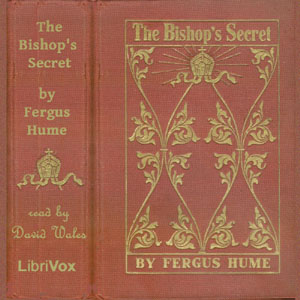
Bishop Pendle is the Church of England bishop in a small fictitious English cathedral town. Several years into his work, he receives a visit from a disreputable-looking visitor. The bishop is much upset. What transpired between them that has so upset the good churchman? And then there is the murder. Fergus Hume was one of the most prolific and most popular of 19th century novelists. "Mr. Hume won a reputation second to none for plot of the stirring, ingenious, misleading, and finally surprising kind, and for working out his plot in vigorous and picturesque English. In "The Bishop's Secret," while there is no falling off in plot and style, there is a welcome and marvelous broadening out as to the cast of characters, representing an unusually wide range of typical men and women. These are not laboriously described by the author, but are made to reveal themselves in action and speech in a way that has, for the reader, all the charm of personal intercourse with living people...."
(Book Preface and david wales)
40 episodes
Eleven stories of war by the author of The Red Badge of Courage. Stephen Crane was an American author. He is recognized by modern critics as one of the most innovative writers of his generation. Crane's writing is characterized by vivid intensity, distinctive dialects, and irony. Common themes involve fear, spiritual crises and social isolation. His writing made a deep impression on 20th-century writers, most prominent among them Ernest Hemingway, and is thought to have inspired the Modernists and the Imagists. - Summary by Wikipedia and david wales
19 episodes
Fanny Knocker is a very, very plain young woman. She is introduced to the extremely handsome, thoroughly impoverished, younger son of an old family. What will transpire? (David Wales)
6 episodes
It is Paris sometime after the Franco-Prussian War (1870--Germany won--the French Second Republic collapsed--France embittered). A French poet and a German composer come to admire one another's work and decide to collaborate on an opera. There are costs to pay. ( david wales)
2 episodes

As usual, Trollope creates a nice variety of characters of different English classes, sentiments and positions. The primary themes are the inheritance of property, extravagance or reason in the spending of assets, the mating of young people, and the electoral practices of the time. The election chapters are based on Trollope's own experiences when he ran for Parliament.There are, of course, many subplots which allow Trollope to express, through dialog, his opinions about greed, snobbery, work ethics and dandyism. Trollope probably regretted the duplicative naming of his characters after a while; we have two Gregory Newtons, uncle (and present Squire of Newton) and one of his nephews. Then there are several Ralphs: the (deceased) father, Ralph his son (the heir), and Ralph (not the heir) the son of the uncle Gregory! As they appear, Trollope has to interject "not the heir", or "the other Ralph". Ralph the heir is an extravagant, easy living young man who has spent himself into debt, and is faced with having to either sell his right to the family property, or marrying a wealthy tradesman's (a breeches maker cutely named Mr. Neefit) daughter. Four young women are major characters, and these are sought by the two Ralphs, young Gregory, and a bootmaker, Ontario Moggs (don't you love the names?). These include the fairly sedate daughters of the family lawyer, a ravishing West Indian beauty come to live with them, and the tradesman's daughter. There are the classic novel "misunderstandings" from errors in communication; while the reader knows the real circumstances, the characters can't resolve issues apparently standing in the way of love or friendship. This is one of the few novels in which the reader can applaud such a misunderstanding, keeping the undeserving heir from unmerited success in his wooing. ( Arnold Banner)
58 episodes

These 'tales' describe a series of encounters between various magazine editors and those who wish to have their works published. While containing some amusing bits, the tales are relatively grim, compared to most Trollope stories.
The Turkish Bath: This editor, visiting a Turkish bath, is accosted by an Irish stranger, who, after some conversation, requests to submit a manuscript to the magazine. The editor's reactions to the solicitation and subsequent familiarity with the writer's circumstances forms the frame of the story. Humor arises about the Turkish bathing situation, and the reluctance of editors to make themselves available to amateur writers.
Mary Gresley is the rather sad tale of a young girl's giving up her writing career to satisfy the deathbed wish of the curate she was engaged to. The editor, in this tale (and also in the next), became rather involved emotionally with the girl and wished her to continue writing.
Josephine de Montmorenci is actually the proposed pen name of a disabled young lady, who only became acquainted with the editor because her attractive sister in law initiallly pretended to be that author.
The Panjandrum (meaning 'appearing to be important') is a magazine proposed by a group of literate but incompatible, inexperienced, would-be writers. The clash of personalities brings about the demise of the venture.
The Spotted Dog offers another writer, down on his luck; he and his wife drink excessively. He had been well educated and the editor offers him the task of indexing the work of a third person, but his drunken wife destroys the manuscript.
Mrs. Brumby is the most amusing of the tales. In this one the editor encounters a poor writer who is, unfortunately for him also a remarkably aggressive and ambitious woman. (Summary by Arnold Banner)
21 episodes
In the small English Town of Plumplington the daughter of a brewer and that of a banker each has selected her future husband contrary to the wishes of her father. Both young men are regarded as not 'good enough', though each is, in fact, much like the respective father when at that age. The girls, with the support of various townspeople, endeavor to get their way. One refuses to wear the nice clothes her father so much admires her in, while the other takes to her bed and refuses to eat. The fathers, of course, give in, and ultimately agree to the happy ending. (Arnold Banner)
8 episodes
Katerina Lwowna, eine junge Frau aus armen Verhältnissen, geht eine Vernunftehe mit dem über 25 Jahre älteren Kaufmann Ismajlow ein. Ihr neues Leben in der russischen Provinz verläuft voller Langweile, ohne Freude, ohne Liebe und ohne Kinder. Sie nutzt die erste Gelegenheit, sich einen Geliebten zuzulegen, den jungen hübschen Hilfsarbeiter Sergeij. Die Beziehung wird von ihr mit solcher Leidenschaft geführt, dass sie skrupellos und mit viel krimineller Energie alle sich ihr in den Weg stellenden Hindernisse beseitigt. Als Sergeijs Leidenschaft verebbt und er noch dazu Katerina öffentlich verhöhnt, strebt die Handlung rasant einem furchtbaren Ende zu. (Zusammenfassung von Friedrich)
3 episodes
Uli der Pächter ist die Fortsetzung von Uli der Knecht. Die Handlung ist im Berngebiet angesiedelt. Uli ist nun mit seinem Vreneli verheiratet und bewirtschaftet einen Pachthof, doch ständig ist er in Sorge, ob er den Pachthof auch zahlen kann. Uli erfährt als Pächter in seinem bäuerlichen Umkreis zwar leidvoll die Schlechtigkeit der Menschen, hat aber auch Helfer in der Not. (Zusammenfassung nach Wikipedia) LibriVox Aufnahme von Uli der Knecht
29 episodes
Cradock Nowell: a Tale of the New Forest is a three-volume novel by R. D. Blackmore published in 1866. Set in the New Forest and in London, it follows the fortunes of Cradock Nowell who, at the end of Volume 1, is thrown out of his family home by his father following the suspicious death of Cradock's twin brother Clayton. It was Blackmore's second novel, and the novel he wrote prior to his most famous work Lorna Doone. ( Wikipedia)
*Warning: Some listeners may be offended by some of the language. Words that were considered acceptable in the nineteenth century are not always politically correct today. It is LibriVox policy to leave the original wording as the author intended. - Summary by Lynne ThompsonOther volumes in the series:Cradock Nowell, volume 1Cradock Nowell, volume 3
17 episodes
Follow the young boy Huckleberry Finn and the slave Jim on their epic journey down the Mississippi River in the years before the Civil War. This masterpiece by Mark Twain is a delightful mixture of exciting adventures, sad mishaps, floods, lazy days floating on the raft, conniving con men and human beings in their most bewildering variety. It is a great pleasure to read and listen to. (by Phil Chenevert )
43 episodes
Nina Clemmens was adopted as a baby. When her parents die, she goes to live with her religious aunt, who mistreats her because of her temper and her origin. Nina has been haunted by a woman in black for her whole life. She meets Dr. Monteith, who is a widower whose wife died in childbirth. Will Nina be safe with him? Will she come to know the God both her aunt and Dr. Monteith claim to serve? Will she ever be accepted despite her lack of pedigree? When a young man carelessly insults her, she vows revenge. But it is not as simple as she thought. Will she be reconciled to the one she loves? Will the mystery of the woman in black be solved? (Summary by Bria Snow)
50 episodes

"Mary Barton: A Tale of Manchester Life" was Mrs Gaskell's first full-length novel. It was published anonymously in that tumultuous year of political change, 1848 - only a few months after the Communist Manifesto co-authored by her fellow Manchester-resident, Friedrich Engels. Engels's experience as agent in his father's cotton-spinning factory motivated him to write "The Condition of the Working Class in England", a classic account of the sufferings of the poor under the factory-system.
Elizabeth Gaskell's own personal contact with the plight of the poor cotton workers of Lancashire also compelled her to a compassionate examination of their lives; but as a middle-class woman, married to a Unitarian minister, her approach to her subject took on a more emotionally complex significance; influenced by religious faith but also by more personal considerations.
In the brief preface to the novel, Mrs Gaskell hints at her initial impulse. The loss of a beloved child in infancy led her to seek a therapeutic outlet, but one which left her uncertain of her capacity to contextualize her public, writerly response to the tragedies occurring in the surrounding society of Manchester's poorest classes: "I know nothing of Political Economy, or the theories of trade..." She was, however, determined to portray, in novelistic form, the intimate connection between the private experience of her characters and the social forces of her time. The success of the novel led her to proclaim her authorship and move on to further works of fiction, which have secured her in our times a mounting reputation as one of the leading novelists of the mid-Victorian period.
Certainly the novel features numerous death-scenes, all conveyed with a depth of sympathy that contrasts with the queasy iambics with which Dickens orchestrated the notorious demise of Little Nell. Mrs Gaskell was not, like Dickens, a London-based novelist observing the sufferings of the provincial poor with a journalistic detachment - as evidenced in his own admirable, Lancashire-based novel "Hard Times". Gaskell lived among the people whose attenuated lives she chronicled - and however hesitantly, as a début novelist, she rendered their experience in literary terms, her writing presents us with a true insight into the sufferings of individuals at a point in history when the mass of human beings fell casualty to the forms of economic progress following upon the Industrial Revolution. Most impressively she called into question the political and social cost of creating a resentful proletariat despairing of survival in (to quote Karl Marx) a "heartless world".
Our reader Tony Foster is a resident of Manchester and a near-neighbour of Mrs Gaskell (allowing for their separation in time). His superb narration renders the native speech of her characters with an authenticity which ideally conveys the spirit of this book. A truly moving experience awaits everyone who gives ear to this 'Tale of Manchester Life'. (Summary by Martin Geeson)
39 episodes
Een groepje Leidse studenten viert een gezellige Sinterklaasavond in de jaren '20 van de 19e eeuw, als er onverwachts een pakketje aan de deur bezorgd wordt. Tot ieders grote verrassing vinden ze daarin een baby. Zij besluiten zich als groep over het meisje te ontfermen. Deze roman, een bestseller bij de verschijning in 1866, verhaalt over de lotgevallen van de vondeling.
Dit is deel 1 van in totaal 5 delen (de andere delen zijn nog niet beschikbaar op Librivox). Hierin leren we de studenten kennen, en Klaasje Zevenster als jong meisje. Als ze klaar is op haar kostschool komt ze bij één van haar ‚vaders’ logeren, Gerlof Bol, die inmiddels dominee is. Dat heeft verstrekkende gevolgen. (Samenvatting van Anna Simon)
Andere delen:Deel 2
Deel 3-5: nog niet klaar
20 episodes

Der Roman aus der Epoche des russischen Realismus gibt einen tiefgründigen Einblick in das Leben und die Lebensanschauungen der russischen Aristokratie des 19. Jahrhunderts. Mehr noch begeistert er durch die bis ins kleinste Detail mit großer Menschenkenntnis dargestellten Charaktere, deren Wesen Tolstoi uns weitestgehend durch ihre Art zu sprechen, denken, handeln und ihre "Kreise" auszuwählen näher bringt.
Seitensprünge sind in der besseren Gesellschaft durchaus üblich, jedoch nicht solche von der Art, wie Anna Karenina ihn begeht. Auch gelten für Ehebruch bei Frauen andere Maßstäbe als bei Männern, wie das Beispiel von Annas Bruder, Stepan Oblonski, zeigt. Die Handlung bewegt sich aber auch in vielen anderen Spannungsfeldern – z.B. denen zwischen Gutsbesitzern und Bauern, Stadt und Land, Gesunden und Kranken, Vorgesetzten und Untergebenen, Russland und dem Ausland, Fortschrittsdenken und Konservativismus, Moskau und St. Petersburg.
Im Mittelpunkt stehen drei Familien. Dies sind zum einen die in St. Petersburg lebenden Karenins und Wronski (Annas Liebhaber), dann die in Moskau ansässigen Oblonskis und schließlich die Lewins, die sich am wohlsten auf ihrem Landgut fühlen. Obwohl diese Familien verwandtschaftlich miteinander verbunden sind, könnten sie doch nicht unterschiedlicher leben. Durch ihr Beispiel bringt Tolstoi den Leser zum Nachdenken darüber, wie man richtig leben soll. (Zusammenfassung von Eva K.)
117 episodes
Young bride Christiane arrives in Auvergne to "take the waters" with her husband, described as "a sickly flower, or a sucking pig with its hair shaved off." But rather than the relaxing family vacation she expects, she finds herself the center of a conspiracy between her father, the Marquis, and the "fossil" medical team in an effort to solve the problem of a lack of heir. Suddenly the discovery of a new spa throws the resort into disarray and brings a lowly family to prominence. Romantic intrigue, financial speculation, satire in the medical profession, a social commentary on the status of women, are all delivered in de Maupassant's picturesque prose. (Lynne Thompson)
18 episodes
La tranquillità di una cittadina di provincia, il progetto di uno zelante sottoprefetto e la vita sentimentale della signorina Adele Ruzzani, vengono messi alla prova dalla presenza dei frati laici del convento di San Bruno.
20 episodes

At the age of nine, Elias Lossell becomes deaf and blind from an accident. Communication with him becomes difficult, and mentally, he never really grows up. Years later, circumstances make him the richest man in town as the heir of the wealthy firm of tea merchants, while his two younger twin half-brothers Hendrik and Hubert are left to do the actual work of management on his behalf. This causes a lot of resentment, especially with half-brother Hendrik, who loves money, and is also hampered by a headstrong, spendthrift wife. Hendrik tries to gain control of the firm and buy out Elias by any means, but things get out of hand.
The novel is full of satirical comments and asides directed at the reader. It is set in the fictitious Dutch town of Koopstad (“Buying City”), where money, commercial success and social status are very important. It gives a satirical view of contemporary life at the end of the 19th century. The novel was a bestseller at the time of its appearance in 1892, though it is now all but forgotten. Maarten Maartens (1858-1915) was a Dutch writer who wrote all his principal literary work in English. (Summary by Anna Simon)
52 episodes
Los pazos de Ulloa es una novela de Emilia Pardo Bazán (1851-1921) publicada por primera vez en 1886. Se trata, dentro del realismo literario español, de la novela que mejor ejemplifica la corriente naturalista, al reflejar la aceptación de las teorías positivistas aplicadas a la literatura por el escritor francés y padre del naturalismo Émile Zola. (Summary from Wikipedia) Nota: En el texto del Proyecto Gutenberg no existe el capítulo VI (sexto) como tal, ya que se encuentra incluido en el capítulo V (quinto), por lo que el lector lee dicho capítulo, VI (sexto) de La Biblioteca Virtual Miguel de Cervantes. Texto aquí.
30 episodes
Pan tells the story Lieutenant Glahn and his summer in a forest north in Norway. He lives in a hut with his dog Aesop and they spend their days to hunting and fishing. In poetic language, Hamsun paints troubled souls in this gem of a book.The text is devoted to the nature in Nordland as well as the people Glahn meets there, as they deal with love, jealousy, and power struggles. We meet two (equally unreliable) narrators, Lieutenant Glahn in the book itself and a hunting companion in the epilogue, consisting of the last five chapters. - Summary by kathrinee
7 episodes

Katharine has married Jack Ralston secretly and hoped to force her rich uncle's hand in assisting him to find a career. After his refusal, she couldn't face her new husband to break the news and a series of mishaps led everyone - Katharine included - to believe Jack had fallen victim to the demon he had been fighting: drink. Realizing that she need not acknowledge the marriage, yet unable to continue on as a single woman, she attends a dinner with some misgivings, knowing she will be seated by him. Meanwhile, he is confused by her cold treatment of him, assuming she had received the letter he sent her. All is explained at the dinner - but what will they do now? Continue as if nothing had happened? Or has the misunderstanding caused too great a rift? Will Jack 'buckle down' and take the boring office job he has already rejected, in order to be able to claim his wife and support her? Does the west hold the promise of a new beginning? Or will they swallow their pride and accept the very generous gift from Uncle Robert, which they have already rejected in order to make their own way? And how does Frank Miner's news that Uncle Robert intended to buy the newspaper affect things? In this sequel to Katharine Lauderdale, we follow the newly married couple as they navigate the treacherous waters of married bliss. - Summary by Lynne Thompson
35 episodes
Cumbres Borrascosas, es considerada una de las obras maestras de la literatura inglesa. Narra la historia de amor entre Heatchliff y Catherine.
Heatchcliff es un niño huérfano que el señor Earnshaw, padre de Catherine, lleva a “Cumbres Borrascosas” para criarlo como si fuera hijo suyo. Entre Catherine y Heathcliff nace una gran amistad, sin embargo el hermano de Catherine, Hindley, no pierde ocasión de humillar al niño.
Con el tiempo esta amistad entre ambos niños,va transformándose en un amor tan intenso como turbulento... (Montse González)
34 episodes
Pepita would rather become a witch than a wife. She's seen too many women, including her mother, wither away at their husband's hands. Popular and respected, our gentle, but fiercely independent heroine immediately grows cruel and cold to any suitor drawn in by her allure. When a famous bullfighting lady killer from Madrid takes interest in her, will Pepita's resolve crumble with disastrous consequences? A hit upon its 1899 release, this novella later spawned both a play and silent film adaptation. Despite its public popularity, its (now rather tame) intense love story and positive portrayal of Spaniards drew some controversy from English critics. Summary by Mary Kay.
14 episodes
This is a collection of well-written engaging short stories written by "Q", the pen name of the prolific and eccentric Sir Arthur Thomas Quiller-Couch. - Summary by Amy Gramour
24 episodes
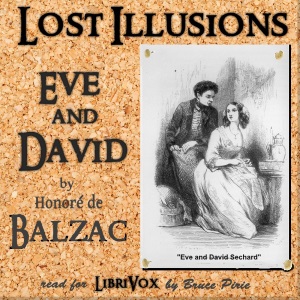
Ève and David (1843) is the final book in Balzac’s Lost Illusions trilogy, which is part of his sweeping set of novels collectively titled La Comédie Humaine. The story is set in post-Napoleonic France. In the first volume of the trilogy (Two Poets, 1837), we meet Lucien Chardon, an aspiring poet frustrated by the pettiness of provincial life. In the second volume (A Distinguished Provincial at Paris, 1839) Lucien, now using the more aristocratic-sounding surname "de Rubempré," leaves his family in order to seek fame and fortune in the literary world of Paris. By the end of that book, he faced imminent emotional and financial collapse.In this present volume, the reader is returned to the provincial town of Angoulême, where Lucien's sister Ève and her husband, Lucien's friend David, have been desperately struggling against clever competition to keep a their printing shop afloat. Their situation is complicated when Lucien's financial distress spills over into their lives.Balzac’s work was hugely influential in the development of realism in fiction. The Lost Illusions trilogy is one of his greatest achievements, and is named in the reference work 1001 Books You Must Read Before You Die. (Summary by Bruce Pirie)Other volumes in this series:Lost Illusions: Two PoetsLost Illusions: A Distinguished Provincial at Paris
The story of Lucien de Rubempré continues in the sequel, Scenes from a Courtesan's Life
20 episodes
This light and somewhat awkward comedy centers on artist Bernard Longueville, scientist Gordon Wright, and the sometimes inscrutable heroine, Angela Vivian. The plot rambles through various romantic entanglements before reaching an uncomplicated, but still believable happy ending. (wikipedia)
30 episodes

Scenes from a Courtesan's Life is one of the last great works completed by Balzac for his huge novel series entitled The Human Comedy. Sections of this book, in various groupings and with various titles, were published between 1838 and 1847. It eventually settled into the four sections found in the present edition. The French title — Splendeurs et misères des courtesanes — literally, Splendors and Miseries of Courtesans — has also been translated as A Harlot High and Low. The story picks up at the end of Lost Illusions (1843), an earlier novel by Balzac. At the end of that book, Lucien de Rubempré (born Lucien Chardon), a young provincial poet with great ambitions but feeble moral will, was heading for Paris in the company of a mysterious Spanish priest. In the present book, we quickly discover that the "Spanish priest" is actually Jacques Collin, alias "Vautrin," a master criminal first introduced to readers in Balzac's Father Goriot (1835). Lucien develops a relationship with Esther van Gobseck, a prostitute (the "courtesan" of the title). With these three main figures — Lucien, Vautrin, and Esther — Balzac explores the corruption of the aristocracy, the world of prostitution, the courts, and the prisons of 19th-century Paris. With masterful depictions of society and individual psychology, Balzac is considered a father of realism in fiction. - Summary by Bruce Pirie
The Balzac Lost Illusions trilogy preceding this book:
Lost Illusions: Two Poets
Lost Illusions: A Distinguished Provincial at Paris
Lost Illusions: Ève and David
68 episodes

In “The Country House”, John Galsworthy explores many of the themes he would later expand upon in his better known, nine-novel, “The Forsyth Saga”. This is a novel of English society as 1900 approaches. A divorce is being threatened in the Pendyce family, whose members are of the landed gentry. Such an event would be an enormous scandal. There is little action. The story paints, in exquisite language, the feelings of each of the six or so main characters. These feelings concern the necessity for family honor and the horror of scandal; the stifling effect of the social mores of the time; the ridiculous complications of the law; and, the threat of the many changes in the social order which seem to be coming. Galsworthy was himself of this privileged class. While he was extremely critical of the social structure of the time, he shows sympathy for those caught in it. Each is constrained to his or her niche; only by major changes in the social code will that be changed. Gaslworthy was very much a social activist in life, as well as on the printed page. He was quite successful in showing the reader how it must have felt to live in one of those social niches. (Summary by BobR)
31 episodes
Een groepje Leidse studenten viert een gezellige Sinterklaasavond in de jaren '20 van de 19e eeuw, als er onverwachts een pakketje aan de deur bezorgd wordt. Tot ieders grote verrassing vinden ze daarin een baby. Zij besluiten zich als groep over het meisje te ontfermen. Deze roman, een bestseller bij de verschijning in 1866, verhaalt over de lotgevallen van de vondeling.
Dit is deel 3. Klaasje/Nicolette, een jaar of 20 oud, gaat in het begin van dit boek aan het werk als gouvernante van de kinderen van één van haar pleegvaders. Al snel komt ze in de problemen. - Samenvatting door Anna Simon
22 episodes
Fashionably controversial bestseller at the time of appearance (1893), portraying London "society" in the Fin de Siècle. Dodo is a young woman who enjoys belonging to the high society. At the start of the book, she is about to make an advantageous marriage, to a man with money and a title - just what she needs.
This audiobook includes Volume 1 & 2 (the complete novel) - Summary by Anna Simon
21 episodes
Всеволод Михайлович Гаршин (1855-1888). Его первый опубликованный рассказ «Четыре дня» сразу принес ему известность. В его творчестве драматизм действия заменён драматизмом мысли, драматизмом переживаний, которые и являются основным материалом для Гаршина. Писатель страдал приступами нервного расстройства и в возрасте 33 лет совершил самоубийство.
Первые пять сказок адресованы детям, "Сигнал" подросткам, остальные для зрелой аудитории.
Vsevolod Garshin (1855-1888). His short stories were an immediate success, but he suffered from periodical bouts of mental illness. At the age of 33 he committed suicide. His stories are characterized by a spirit of compassion and pity comparable to Dostoevsky's and Chekhov's.
His story Signal appears in English translation in LibriVox "Best Russian Short Stories" collection here.
(Mark Chulsky and Wikipedia)
22 episodes
A ruthless squire becomes obsessed with a younger woman and conspires against her lover, George Fielding, so that the squire can win her. With the squire's financial pressure turned up on his family, George goes to Australia to earn money enough to marry his girl. In the meantime, a young man named Tom Robinson is sent to prison for stealing. For his somewhat minor offense, he suffers severe mistreatment in prison. "It Is Never Too Late to Mend" was written in the 1850s to shed light on abuses in British prison discipline and the treatment of criminals, but is also an adventure yarn set in the gold fields of Australia. (Summary by TriciaG)
84 episodes
Smoke is an 1867 novel by the highly acclaimed Russian writer Ivan Turgenev (1818–1883) that tells the gripping story of a secret love affair between a young betrothed Russian man and a young married Russian woman, while also delivering in the opening chapters the author's criticism of Russia and Russians of the period. The story takes place largely in the German resort town of Baden-Baden. -- Adapted from Wikipedia: https://en.wikipedia.org/wiki/Smoke_(novel)
29 episodes
A lesser known novel by the sensational English novelist, Charlotte's Inheritance opens in Paris in a dilapidated boarding house let to students by a scarcely adequate landlady. Enter Gustave, a young provincial, arriving in Paris supposedly to study law, but in reality as the proposed husband of the dour and unattractive daughter of his sponsor. Unable to tolerate the life arranged for him, Gustave quits the boarding house but recommends it to a mysterious young English widow who approaches him for assistance. - Summary by Lynne Thompson
48 episodes
A Carmelite convent in Kentucky in the nineteenth century. A beautiful immature nun. A handsome immature visitor. A chance meeting. Whither? One might want to compare this story (1890) with an earlier one with a similar theme by the same author, The White Cowl (1888). ( david wales)
6 episodes
Orphaned Mabel struggles to raise her sisters by working as a sewing girl for long hours and low wages. She meets her challenges with a calm steady faith while her younger sister chafes against the injustice of their lot in life. She is determined to uncover the mystery she thinks is lurking behind their misfortune. This book will appeal to those who love intimate family dramas, light mysteries, scathing social commentaries, or sewing machines! ( Jennifer Fournier)
42 episodes
